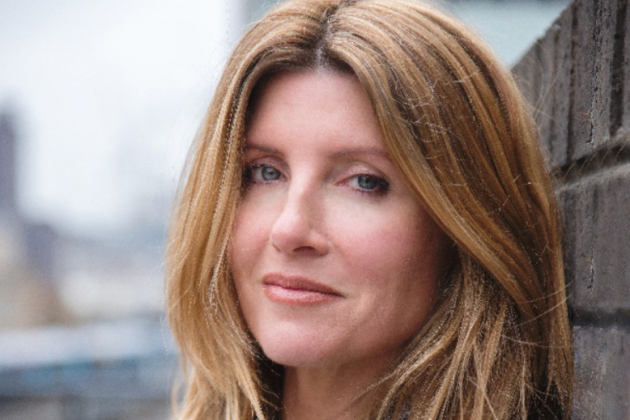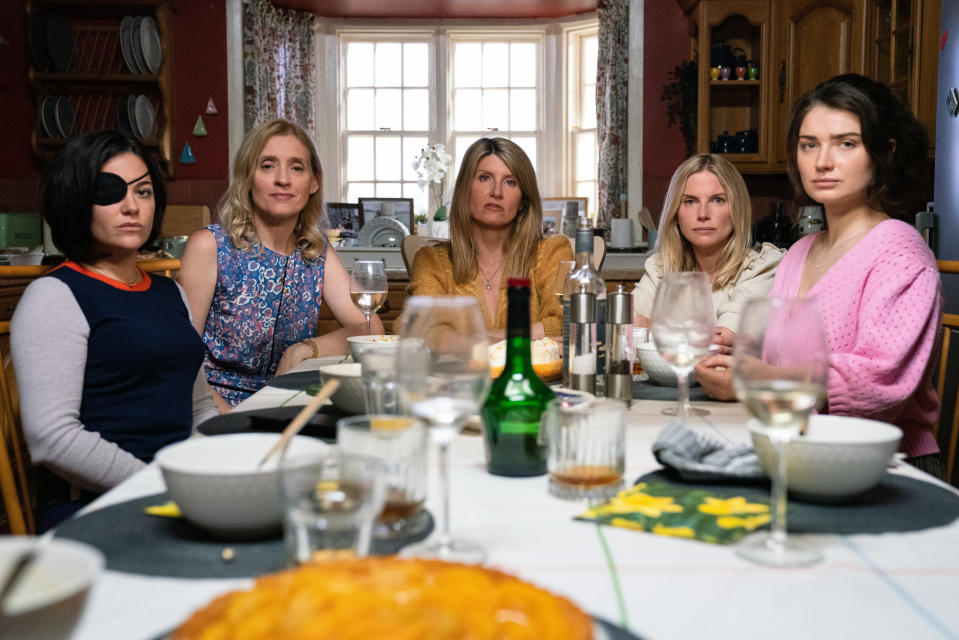Sharon Horgan and the Sisterhood of ‘Bad Sisters’
- Oops!Something went wrong.Please try again later.
- Oops!Something went wrong.Please try again later.

Sharon Horgan, the Irish actress and writer, has mined the absurdities of parenting (“Catastrophe”) and the vagaries of the dissolution of a marriage (HBO’s “Divorce”). So it’s perhaps fitting that her next project would up the ante to mariticide.
“Bad Sisters,” the AppleTV+ series that drops its finale on Friday, has straddled a delicate line between farce and tragedy. The story — which Horgan adapted from the original Belgian series “Clan” created by Malin-Sarah Gozin — is an exploration on the bonds of sisterhood and the moral hypocrisy of the patriarchy. It’s among one of Apple’s buzziest shows, alongside “Ted Lasso,” “Severance” and “Slow Horses.”
More from WWD
The story revolves around the five Garvey sisters; Eva (Horgan), Becka (Eve Hewson), Ursula (Eva Birthistle), Bibi (Sarah Greene) and Grace (Anne-Marie Duff). Four of them spend the first nine episodes of the series attempting to murder JP (Claes Bang), the evil, abusive husband of Grace, who is withering under the strain of the relationship. The series opens with JP’s funeral and unfolds in flashback.
Complicating the sisters’ plan to rid the world of an irredeemably bad apple are two insurance adjuster brothers (Brian Gleeson and Daryl McCormack) who are trying to get out of paying JP’s life insurance claim by proving his death was no accident. While the sisters’ numerous failed murder attempts are often played for slapstick laughs, the series also confronts the emotional fallout from domestic abuse and sexual assault. It’s a comedy with strokes of pathos and peril. In the post-#MeToo, post-Roe era, “Bad Sisters” is an anthem to the power of the sisterhood.
Horgan herself is one of five siblings, born in England to an Irish mother and New Zealander father. When she was in grammar school the family relocated to Ireland to run a turkey farm. How did her upbringing influence her career as a performer; did she have to strain to get her parents attention?
“Yes, I did strain,” she laughs. “I did really strain. I sort of turned myself into a clown. I would do impressions, fall over, whatever I needed to do to get my mum and dad’s eyes on me, I did. You’ve got to find that thing in a large family; you’re the sporty one, or the clever one. I was not any of those things. So obviously I was the funny one for sure.”
At the moment Horgan is preparing to direct a movie; she is also writing another comedy, which she has described as Linklater-esque. Meanwhile, Starz’s Courteney Cox thriller “Shining Vale,” which she cocreated with Jeff Astrof, is in production on season two. As to whether there will be a second season of “Bad Sisters,” Horgan stresses that it was conceived as a limited series.
As the finale of “Bad Sisters” is set to reveal all — Will the sisters get caught? Who really killed JP? — Horgan talks to WWD about those heavy emotional scenes, why Ireland is more progressive than the U.S. and where the beloved “Catastrophe” characters are now.
WWD: “Bad Sisters” is based on a Belgian series. And then you took it and made some changes. Were you looking to do something about a community of women?
Sharon Horgan: I realized after I fell in love with it that, yes, I was in the marketplace for something that was about a group of women, or the five stages of a woman’s life. And I’ve sort of lived a bunch of them. But I had no idea I was going to write a thriller as my next thing. I mean, honest to god, that couldn’t have been any less on the cards. But I absolutely loved working in the genre.
WWD: It does have elements of a thriller. But at times it’s also a very dark emotional drama, particularly as it depicts and discusses domestic abuse. How did you navigate that?
S.H.: I feel very jaded about watching dramas where the woman is victim, or crime dramas where the woman is murdered and that is entertainment. And I’m even more jaded with the idea of the sort of sexy abuser, the attractive rapist. I was nervous about all of that. I was really nervous about handling a story about a woman who’s in that kind of abusive relationship and to do that in the context of comedy. It’s not a comedy but a drama that has comedy in it; it has moments of real silliness. I’ve never been more cautious whilst writing something and, you know, genuinely sleepless nights wondering if I was doing the right thing. And also wondering why I was doing it.
We started working on this just as [COVID-19] lockdown was descending on us. And pretty soon after that it was a lot of stories in the papers about the rise of domestic abuse, horror stories of women and vulnerable people locked up with their aggressors. The very thought of it that [motivated] me to get it right and to do it right. And of course, we had this insanely talented actress [Duff] who couldn’t be any more capable of portraying that kind of character. So, yeah, it was terrifying. I mean, there are some very silly [scenes]. But then on the other hand, there are some of the most brutal scenes I’ve ever written. We just had to trust the material. But I never stopped worrying about it. So I was a bit of a wreck at the end of it.

WWD: There’s also a lot of drinking. And some of the drinking is to numb pain. Were you worried about depicting characters drinking too much?
S.H.: Weirdly, it was something that got talked about a lot initially. When I started going into Eva’s character more we worried about it [being] a trope. Sometimes it [alcohol] seems like a treat or a lovely sociable thing and sometimes it really isn’t. For Eva seeing her falling asleep in front of the TV with a bottle beside her, that idea of having a drink on her own, when everyone goes home, that’s when it gets hard. But at the same time, I never wanted to show Eva as a tragic character even though she’s living in that big house full of memories. I feel like a lot of women who are natural mothers don’t always get to be a mother. And I think, for the most part, she’s found a way to be OK with that. There’s a lot of hope in the character. It’s never straightforward, is it? You can never straightforwardly say, “I’m OK with being single, I’m OK with being on my own.” Because not everyone gets to see behind closed doors when everyone goes home. And so for me, it was trying to balance those two things.
WWD: In the penultimate episode, Eva reveals to her sisters that JP raped her. We are so accustomed to seeing you in comedic roles. How was that scene for you, writing it and playing it?
S.H.: Writing it was kind of upsetting. But we made the choice to tell it rather than see it in a flashback. When Rob [Delaney] and I were working on “Catastrophe,” we would write it and not even think about ourselves saying it because that’s where the story took us. And so, I think it was the same for me with that scene. I wrote what needed to be written and it was really, really painful. The weight of responsibility of telling a story that has to be an abridged version of what would happen in real life, and yet wanting to do justice to that. It really, really hurt to do it. I remember doing an interview alongside Anne-Marie Duff and she said your brain doesn’t know when your body is lying. That’s how it feels. You feel completely exhausted, distraught.
WWD: Both “Bad Sisters” and “Catastrophe” are stories about motherhood, and somewhat tangentially, reproductive rights. Last year Ireland voted to overturn a constitutional ban on abortion. Meanwhile in this country, a flurry of states have imposed restrictions and bans in the wake of the Supreme Court’s decision to overturn Roe v. Wade. Do you find any of this ironic?
S.H.: Who would have thought?! Ireland is a beacon of light at the moment and a great example of what can happen when people come together, talk and stop being scared of the other. There was the gay marriage referendum and then the abortion referendum. At the moment it’s a really enlightened situation there. It was only after that I started thinking, these sisters are a walking metaphor, a walking TV metaphor. There is this deeply religious but hypocritical man who feels like he’s got God and moral righteousness on his side and he sees them as the amoral ones. And then he gets taken down by a group of women who came together and said, that’s enough.
WWD: “Catastrophe” was such a cult hit. A lot of fans were sad when it ended. Do you still think about those characters? How do you think what they would be as parents of teenagers? Or are they even still a couple?
S.H.: If they’re not dead, yes, they’re a couple. We used to think about it a lot when we were on set. But we felt like we said everything that needs to be said about what it is to be parents with kids of that particular age. I do occasionally think about them, but I don’t have a burning desire to go back and revisit them. I feel like [“Catastrophe”] was absolutely perfectly perfect for that time. You can love a show deeply, love the characters and not feel the pull to go back. It just feels counterintuitive. You’ve got to keep moving forward.
Best of WWD

